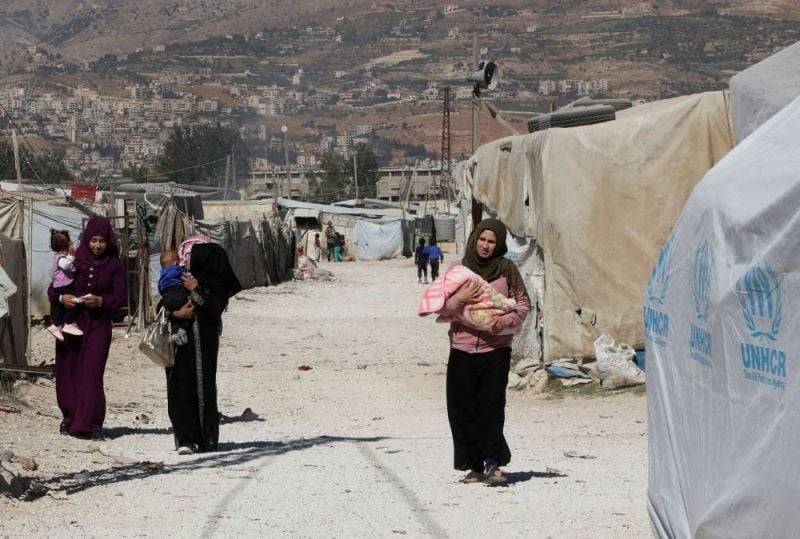
A woman holding her child at a Syrian refugee camp in the Bekaa Valley, Lebanon, Oct. 18, 2022. (Credit: Mohamed Azakir/ Reuters)
Want to get the Morning Brief by email? Click here to sign up.
A group of Syrian refugees was repatriated this morning from Nabatieh in South Lebanon, the National News Agency reported. Caretaker Social Affairs Minister Hector Hajjar announced yesterday that the first group would be repatriated this morning, despite warnings from human rights groups that Syria remains unsafe. Last Friday, caretaker Minister of the Displaced Issam Charafeddine said 6,000 Syrian refugees would be repatriated on Wednesday in three separate convoys. “In enthusiastically facilitating these returns, the Lebanese authorities are knowingly putting Syrian refugees at risk of suffering from heinous abuse,” human rights watchdog Amnesty International said, criticizing the plan despite its apparent emphasis on voluntary return. General Security chief Abbas Ibrahim responded to international criticisms yesterday, claiming the trips are in “the interest of the Lebanese people.” In a September letter to UN Secretary-General António Guterres, caretaker Prime Minister Najib Mikati claimed that “the repercussions of the Syrian displacement crisis” exacerbate Lebanon’s economic downfall. Syrian refugees in Lebanon reported facing discriminatory practices including “arrests at checkpoints … raids on camps, adoption of stricter movement rules, and tensions between host and refugee communities.”
Caretaker Prime Minister Najib Mikati met yesterday in the Baabda presidential palace with President Michel Aoun, in what was reportedly meant as a final visit before Aoun’s term ends on Oct. 31. Parliament remains undecided on his successor ahead of Thursday’s fifth election session. After postponing Parliamentary consultations, Aoun in June appointed caretaker Prime Minister Najib Mikati to a second term as cabinet head. A proposed lineup of potential ministerial appointments leaked in June, though disagreements between Aoun and Mikati since then have slowed progress on the formation of a government. “A government that lacks its powers cannot take over the powers of others,” Free Patriotic Movement head Gebran Bassil said yesterday. He said he does not believe the constitutional provision to transfer — in the case of a presidential vacancy — the head of state’s prerogatives to the cabinet should apply if the cabinet is in a caretaker capacity. If a new president is not elected or a new government is formed by Sunday, Lebanon will be plunged into its first total executive power vacuum.
Syria’s ambassador to Lebanon, Ali Abdel Karim Ali, said that maritime border negotiations between the two countries were not ruled out, but were rather postponed to a later date after a Lebanese delegation’s trip planned for this week was canceled. Ali emphasized that the delegation’s visit was “postponed” due to a “misunderstanding” about timing. President Michel Aoun on Saturday announced maritime border negotiation efforts would be redirected northward as the US-mediated agreement on the southern maritime border with Israel is scheduled for ratification Thursday. Syria’s initiation of gas exploration efforts in a contested offshore area recalls the tensions sparked in June when Israel contracted a vessel to operate in the then-disputed Karish field. Yesterday, Israel granted Energean — the once-controversial-vessel’s operator — permission to start production in Karish, which is part of the Israeli exclusive economic zone under the terms of the new border deal.
Tensions rose in the Palestinian refugee camp Nahr al-Bared, in northern Lebanon, as residents sealed the camp’s southern and eastern entrances with burning tires in an act of protest against a series of raids conducted by the Lebanese Army. Palestinian groups issued a statement criticizing "the military parade of planes, ships and armored vehicles” and the arrest of nine suspects allegedly wanted for drug and assault charges. The raid is an exception to the army’s common practice of non-intervention in camps. "Palestine refugees, living in overcrowded camps ... are at the end of their rope," Philippe Lazzarini, head of the UN’s Palestinian refugee agency (UNRWA) said last Friday, in an “urgent” appeal for funding amid “unprecedented levels of poverty, skyrocketing unemployment rates and increasing despair.” Palestinians were among the more than 100 dead after an informal migration boat that embarked from Lebanon's northern coast sank off neighboring Syria in September, in one of the deadliest such shipwrecks in the eastern Mediterranean.
Cholera patients filled all 20 beds in a newly installed field clinic in Bebnine, Akkar, mere hours after its establishment. The field hospital is the latest measure to combat the spread of cholera, which, since its first recorded case on Oct. 6, has killed 11 people and infected 305 others. Caretaker Health Minister Firass Abiad linked the deaths to victims not having received necessary medical attention, later announcing the Health Ministry would cover the treatment fees for patients hospitalized for cholera at government institutions. The spread of the infectious disease, according to the World Health Organization, is exacerbated by inadequate clean water access. Electricité du Liban’s power supply deficit, which has pervaded various public institutions, caused water shortages across Lebanon on several occasions. Protesters in Saida and its suburbs yesterday blocked roads with dumpster fires, which they also lit outside the local EDL branch, decrying water cuts in the area. With the spread of cholera, Lebanon’s crumbling water infrastructure — which previously translated to water cutoffs and a higher financial burden on citizens forced to purchase privately trucked water — now poses a serious health risk.
In case you missed it, here's our must-read story from yesterday: “Port blast investigation postponed indefinitely, again”
Compiled by Abbas Mahfouz